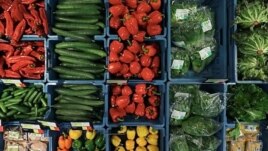19 May 2020
People in some countries have reported making healthier eating choices during the coronavirus crisis.
New research also found that people facing stay-at-home orders tried cooking new things and threw away less food. The results came from a recent research project involving 11,000 shoppers in 11 countries.
A lead organizer of the study was Charlotte De Backer, a researcher at the University of Antwerp in Belgium. She told Reuters news agency the results showed that people were buying less microwaveable food and more fresh fruits and vegetables.

Vegetables are seen in a shop specializing in organic food and natural products in Halle, Belgium May 12, 2020. (REUTERS/Yves Herman)
Muriel Bernard is the founder of Belgium-based organic food online seller eFarmz. She told Reuters she had to nearly double her workforce to 25 to meet demand for her fresh products.
The first part of the study involved shoppers in several European countries, as well as Australia, Chile, Uganda, Canada and Brazil. More than half of those taking part were in Belgium. The research will next be expanded to include 25 additional countries, with final results expected by the end of June.
In nearly half of the countries, shoppers reported buying fewer salty or sweet snacks, although overall sales remained about the same.
De Backer said many people turn to salty, sweet and fatty products when they are feeling stress. But during the current crisis, many people seemed to fill this desire with home-baked goods.
In Chile, for example, there was a large drop in sales of snacks, but a big rise in people buying baking necessities like flour.
Consumption of meat, fish and alcoholic drinks generally remained the same, the research showed.
De Backer said the healthier food buying could be related to the fact that people took more time to carefully plan their trips to the store. "If you make a shopping list, you plan your meals ahead and you are less likely to add unhealthy food."
Many shoppers taking part in the study also said they had tried cooking new things and used more left-over foods to reduce waste. However, De Backer said this behavior could be linked to fears of food shortages and could change after the crisis.
But she noted that some of the improvements in eating are likely to continue. She says this is because in many countries, stay-at-home orders have been in place for more than six weeks – the usual amount of time it takes people to form new behaviors.
De Backer also said that as people grow more confident and creative in the kitchen, they could break down one of the main barriers to home cooking.
I'm Bryan Lynn.
Reuters reported on this story. Bryan Lynn adapted the report for VOA Learning English. Hai Do was the editor.
We want to hear from you. Write to us in the Comments section, and visit 51VOA.COM.
________________________________________________________________
Words in This Story
shopper – n. a person looking for things to buy in a store
microwaveable – adj. able to be cooked in a microwave oven
organic – adj. not using artificial chemicals in the growing of plants and animals for food and other products
snack – n. a small amount of food eaten between meals
stress – n. great worry caused by difficult situations
confident – adj. having a feeling or belief that you can do something well or succeed at something